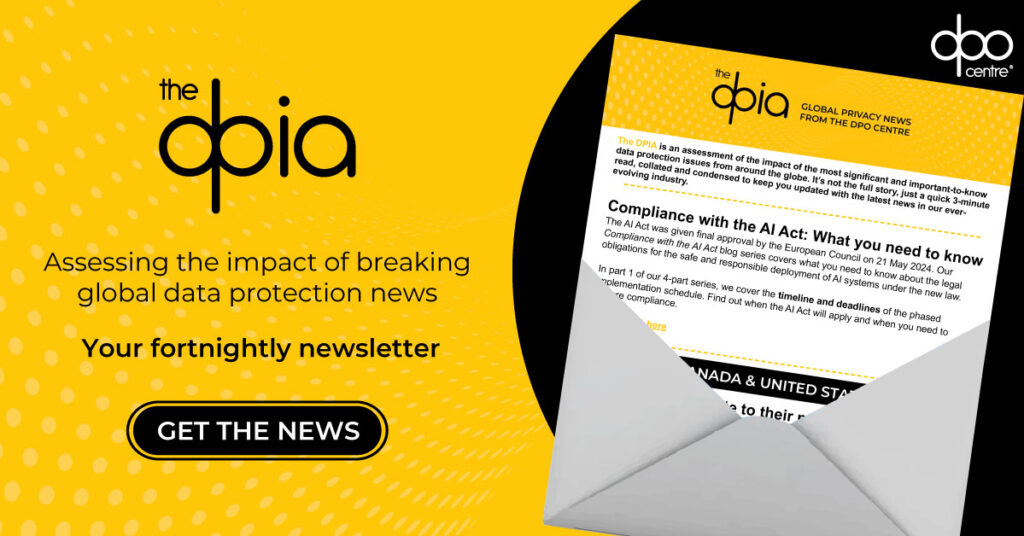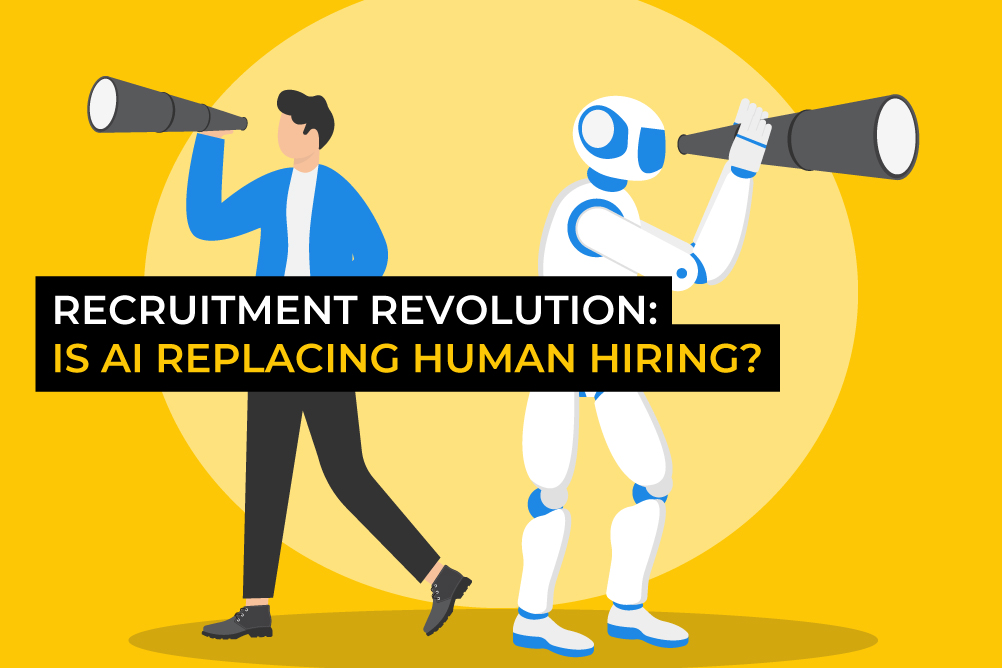AI is transforming the way organizations attract, evaluate, and hire talent. Promising faster and fairer recruitment processes, AI adoption has increased rapidly — but so have critical questions about its use. Can AI make better hiring decisions than humans? Will recruiters become obsolete? And how can organizations strike the right balance between automation
In this blog, we explore AI’s growing role in recruitment and examine where human judgment remains essential. Building on insights from our webinar Hiring or Backfiring: Employing AI in Recruitment, we share expert insights from David Smith (DPO and AI Sector Lead at The DPO Centre), Helen Armstrong (CEO at Silvercloud HR), Richard Bradshaw (Co-founder of PeopleRE), and Nicky Badenock (Co-founder of Genie). Together, they examine the benefits, limitations, and ethical considerations of AI in hiring.
- Can AI recruitment outperform traditional methods?
- Can AI recruitment streamline workflows?
- Is AI a neutral hiring tool?
- Will AI replace recruiters?
- How to choose the right AI hiring tool
- Three questions to ask AI vendors
Can AI recruitment outperform traditional methods?
Resume screening
AI can enhance recruitment by efficiently screening large volumes of resumes based on predefined criteria. When trained correctly, it enables consistent, data-driven decisions that reduce reliance on human instinct and help eliminate bias. However, if the training data reflects existing inequalities, such as historical hiring patterns favoring certain demographics, AI may unintentionally reinforce those biases.
Evaluating cultural fit
Human judgment is essential for evaluating cultural fit. While AI can assess qualifications, experience, and even communication style, it lacks the ability to understand the nuances of personality, emotional intelligence, and team dynamics. These interpersonal traits are key factors in driving long-term success.
AI-enhanced job applications
Recruiters aren’t the only ones making use of intelligent technologies. Job seekers are increasingly using AI to polish resumes, optimize keywords, and auto-generate bespoke cover letters to pass automated screenings. Although effective, this can lead hiring managers to overestimate a candidate’s abilities, creating a gap between expectations and actual performance.
Expert perspectives
Industry experts share their take on the opportunities and challenges that AI brings to recruitment:
- David Smith from The DPO Centre warns that AI could widen the divide. Executive search roles may still see a personalized approach but at the high-volume end of the market, candidates risk being ‘massively disenfranchised’ by low personalisation.
- Nicky Badenock at Genie sees opportunity as AI can go far beyond simple CV matching. While human instinct remains vital and should ‘never go away’, AI offers value in organising and surfacing the right talent form wider pools.
- Richard Bradshaw at PeopleRE highlights the perception challenge. With many candidates believing AI screening removes the human element, it creates ‘real stigma in the candidate market.’ For recruiters, the hurdle is learning how to apply AI effectively in back-office processes.
- Helen Armstrong at Silvercloud HR points out that candidates are already using tools like ChatGPT to optimise CVs for AI systems. Cultural fit remains important and ‘AI can’t ever replace that.’
Can AI recruitment streamline workflows?
AI can significantly cut down recruitment time by automating repetitive tasks, such as resume screening, candidate assessments, and interview scheduling. But success depends on a structured approach: ensuring data quality, integrating AI with existing HR systems, and regularly monitoring performance to improve efficiency.
David Smith, DPO at The DPO Centre believes that ‘To get an automated system to match and evaluate things better, we need to be clearer at describing what we want and what we need. The need for automation improves the entire process.’
Is AI a neutral hiring tool?
AI aims to reduce human bias by evaluating candidates against data-driven criteria. But if the training data reflects existing inequalities, AI systems may replicate them, making regular audits critical to ensure fairness and accuracy.
These tools can also misread career breaks as unexplained employment gaps, overlooking valid reasons like parental leave or caregiving. This can lead to unfair decisions that disadvantage qualified candidates.
Richard Bradshaw, PeopleRE thinks ‘Many recruitment processes fail, not because a candidate lacks the skills, but because they ultimately don’t have a genuine desire for the specific role. While AI can efficiently match candidates based on qualifications and experience, it isn’t yet advanced enough to assess a candidate’s motivation, passion or long-term commitment, rather than just securing any job.’
Will AI replace recruiters?
AI can automate many administrative tasks, but human insight remains vital for success. A recruiter’s ability to assess cultural fit, build relationships, and make context-based decisions is something AI still can’t match.
Helen Armstrong, Silvercloud HR reiterates that ‘Cultural fit is as relevant as having the right qualifications and experience. It’s about attitude and AI is never going to be able to assess that. AI has to be an assistant to the recruiter, not a replacement.’
How to choose the right AI hiring tool
Selecting the right AI tool for recruitment requires careful evaluation of key factors:
- Recruitment goals: Define what you need the system to do, such as resume screening, candidate matching, or interview scheduling
- System compatibility: Ensure the system aligns with your hiring goals and seamlessly integrates with your existing HR tools
- User experience: Choose a platform that’s intuitive for both recruiters and applicants
- Transparency and bias controls: Prioritize systems with clear decision-making processes and built-in bias mitigation
- Analytics and reporting: Choose tools that offer strong reporting features to monitor and improve outcomes
Three questions to ask AI vendors
To ensure you choose a responsible and compliant AI system, ask potential vendors these key questions:
- How is bias prevented?
- What security measures are in place?
- How is system performance monitored and maintained?
Vendors should explain how they train, audit, and refine their algorithms to reduce bias in hiring. Robust cybersecurity protocols must be in place to protect candidate data and prevent breaches. And you need to confirm the vendor regularly audits the system to detect errors, track performance, and resolve issues efficiently.
The future of recruitment: Human and AI
AI brings clear benefits to recruitment: greater efficiency, scalability, and data-driven insights. But its value depends on how it’s implemented. When used responsibly, AI can streamline admin tasks, improve candidate matching, and support more consistent, less biased decision-making.
But there is a risk of creating a two-tier hiring system, where executive roles may retain personalized attention, while high-volume recruitment becomes impersonal. To avoid this, organizations must maintain a human touch.
Ultimately, recruitment should remain a human-led process. Organizations that combine AI efficiency with human judgment will be best positioned to attract and retain top talent.
____________________________________________________________________________________________________________
AI Governance is essential for ensuring AI systems are developed, deployed, and monitored in line with legal and ethical standards. If your organization is starting or scaling its AI compliance journey across the EU and UK, contact us to learn how The DPO Centre can support you with expert guidance for compliance with the EU AI Act, GDPR and the UK’s DUAA regulations.
____________________________________________________________________________________________________________
In case you missed it…
- EU AI Act Compliance part 4: Essential strategies for North American organizations
- Lead generation and the GDPR: A guide for North American businesses
- Large-scale processing and the GDPR: When to appoint a DPO
___________________________________________________________________________________________________________
For more news and insights about data protection follow The DPO Centre on LinkedIn


